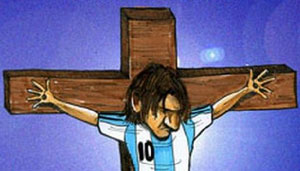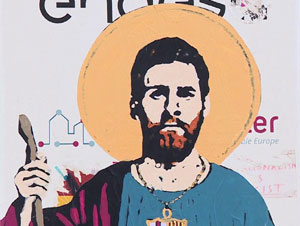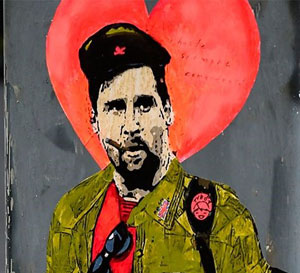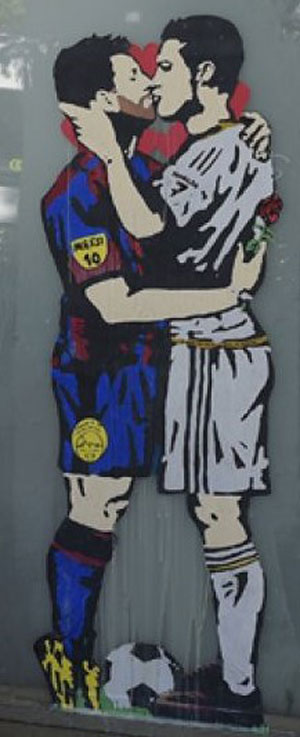He’s done it. Lionel Messi has won the world cup with Argentina. He can sit on his laurels next to Diego Maradona. Argentina’s first world cup, in 1978, was stolen on behest of the country’s military junta, the latter two, with all the dirty tricks Argentina needed to keep up with stronger teams, waiting for their stars to make the difference, were won on desire and belief. More than talent, it was faith in the opportunity they felt they had that saw Argentina through.
If Diego Maradona is God, and he is according to most Argentinian football fans, then Lionel Messi is his son, Jesus Christ. When God died, two years ago, Jesus was 33 years old. High time to make his star shine brightest for all to see. Their first chance, Messi and Argentina got at the Copa América, which they won last year, beating Brazil in the final. Now, in December 2022, he was going to put the crown on his career.
I felt so sure, thanks to Messi’s new role in the Argentinian team. Ever since he debuted as an international, Messi had to do everything alone, or at least he thought he had, obstructed as he felt by teammates, coaches and press. Young Jesus was on his own with his God given talent. He was so much better than anybody else in every aspect of the game, whether dribbling, passing, scoring, even defending, his bulging talent could at times seem like a form of doping that made fair competition impossible. Argentinian society didn’t know what to think of the Flea. Good, yes, very good, ridiculously good, but not magical, not as Diego, who was God because he had come first and showed elegance in everything he did. Barrilete cósmico, he was called during his famous rush over half the pitch during Mexico ’86, shortly after his equally famous hand goal: tiny cosmic barrel kite, what planet are you from?
Argentina has always been in love with God’s seducing style of play, how he caressed the leather, his dancing rhythm, the dramatic beauty of his goals, and on top of that his inability to stamp his authority on a top club. Diego’s football was too pure, his mind too depraved, to reign. His success was short-lived, explosive and sublime, as befits a god. Contrast Messi, who left his motherland as a child to win a never-ending string of titles with FC Barcelona. Above all, Leo Messi possesses otherworldly reactive powers. He seems to exist in another time reality which allows him to do everything he does at exactly the right moment. Jesus’ first touch is of almost digital precision, wrapped in seemingly chaotic movements to wrongfoot his opponents. He truly was exceptional, this son of God, but he couldn’t be cheered on too loudly, out of piety with Diego. And so, captained by Messi, Argentina lost four major finals. Until he found the solution.
In his years at FC Barcelona, his teammates became to rely so much on Leo Messi’s ability to break open a game with a quickfire run and a devasting shot, that they started suffering from what the local press coined Messi dependència. He had to literally solve every match they played, the rest reducing themselves to the dreaded tiki taka. When Neymar left for PSG, Messi could no longer drag all those pampered and overpaid losers around. He could be completely exhausted after only half an hour, and he started losing his shape somewhat. Lionel Messi was in danger of falling off the throne he had occupied for a good decade. And Cristiano, though two years his elder, was still around and scoring goals. Something had to be done.
Messi understood he could only continue being Messi as long as the team he was in were playing well enough, and to have so, he had better let them to it and analyse the opponent’s weaknesses a bit. When they got their nerves together and began passing the ball around somewhat confidently, he would make his first move. This could take up to half an hour, depending on his teammates willingness to work for their money. Messi entra en el partido, the commentators would remark incredulously. It might be some easy doubles with his closest associates, or if luck had it an immediate rush. No longer used to scoring at the first opportunity, the aim was to be close enough to get the crowd going; the Messi, Messi coral working as speed on his aging legs and calculating brain.
That was Barcelona. To get his compatriots accept his new role, something extra was needed. For Argentinians to understand Messi was no longer young Jesus whose talent reaped him scorn, he needed to move on to the saviour’s next phase, that is to get himself crucified. In his role as bearer of everybody’s sins, he could give the team the spiritual impulse they lacked to rise above themselves. Argentina rescata a Messi, the local sports paper got it all wrong. Of course, this new style, with ten smoothly operating players around a fading star, can in only one way be provided with a match winning intervention, and that is when the old hero resurrects himself and leads his team to no longer believed victory. Even the most loyal Maradona fans would love such a story.
In this world cup, Argentina needed time to get going. The opening match against Saudi Arabia was typically lost, to emphasise the need for faith. Against Netherland in the quarter finals, they did not yet feel up to an opponent of Dutch calibre, so they chose to steal the match with typical Argentinian trickery. They thought they’d done it, but defence gave two late goals away, so they had to win the damned penalties. The semis were much better. The team were playing well from the start and Lionel needed only a good fifteen minutes to get going a bit. He shot them ahead with a Harry Kane penalty (Kane’s first one) and then he had a nice little run around the outside of Joshko Gvardiol to assist the game off. So, it was France after all in the final, as many pundits had predicted. It could have been Morocco, who had reason to bemoan the referee’s officiating. They were like street footballers forced by their coach to work their socks of for each other, or else. They were admirable in both spirit and technical mastery and will have made a lot of friends in bars around the globe. Yet, in the end the big boys always win. Ask the Dutch and the Croats.
I saw the match in a nearby bar. The first penalty was easily given, but the counter goal was beautifully executed, and Argentina were generally outplaying France, so all looked well at half time. Whereas Deschamps had brought in some early substitutes, Scaloni felt he couldn’t trust their second tier to be up to the task. The choice team would have to stick it out. As so often when faith in mortals outdoes the trust in football’s righteousness, disaster soon struck. An equally dubious penalty was converted by Kylian Mbappé, who not even two minutes later finished off a fine team move with a bullet of a volley. Argentina were shell-shocked and dragged themselves to extra time, though at the dead Messi delivered a rocket from outside the box that Hugo Lloris narrowly tipped over the bar. Then in the added thirty minutes, both Messi and Mbappé had another one, a tap in and another lousy penalty, so a shootout had to break the tie.
As effective as they both were, more than either Mssrs. Messi or Mbappé the final itself seemed divinely inspired. Luck and skill were evenly distributed, and an interventionist approach effectively helped the story play out as intended. Messi had to win it, there was no other Arabian tale for Infantino to sell the neutrals. Yet, there needed be suffering. So, the best final whatever was born. I was glad Argentina won the shootout decisively, so it could feel a bit as if they’d scored one more. After that, I dropped out.



